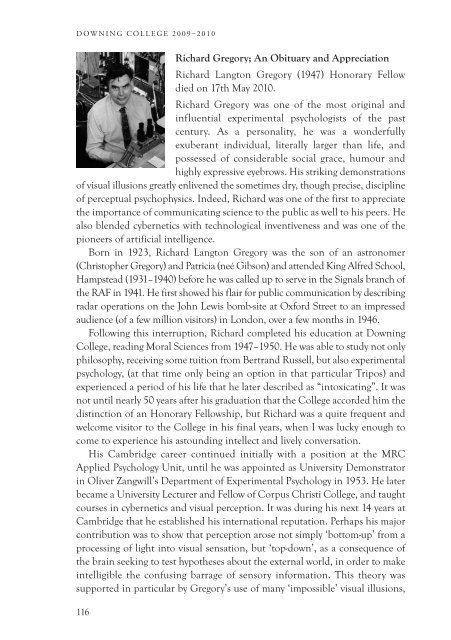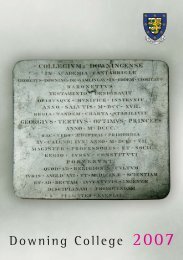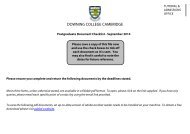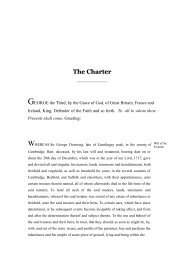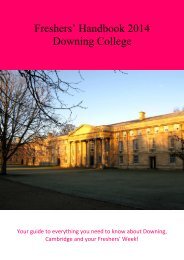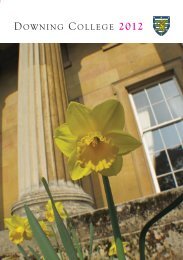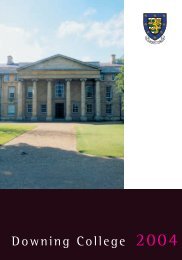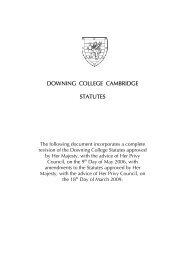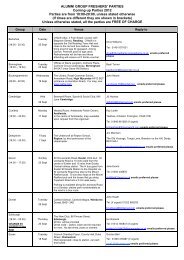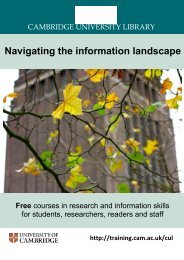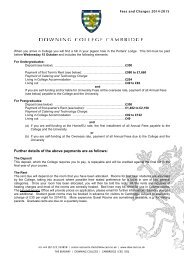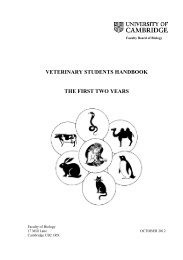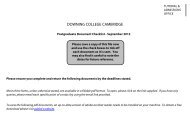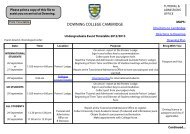Downing 2010 cover opt b_Layout 1 - Downing College - University ...
Downing 2010 cover opt b_Layout 1 - Downing College - University ...
Downing 2010 cover opt b_Layout 1 - Downing College - University ...
- No tags were found...
You also want an ePaper? Increase the reach of your titles
YUMPU automatically turns print PDFs into web optimized ePapers that Google loves.
DOWNING COLLEGE 2009–<strong>2010</strong>Richard Gregory; An Obituary and AppreciationRichard Langton Gregory (1947) Honorary Fellowdied on 17th May <strong>2010</strong>.Richard Gregory was one of the most original andinfluential experimental psychologists of the pastcentury. As a personality, he was a wonderfullyexuberant individual, literally larger than life, andpossessed of considerable social grace, humour andhighly expressive eyebrows. His striking demonstrationsof visual illusions greatly enlivened the sometimes dry, though precise, disciplineof perceptual psychophysics. Indeed, Richard was one of the first to appreciatethe importance of communicating science to the public as well to his peers. Healso blended cybernetics with technological inventiveness and was one of thepioneers of artificial intelligence.Born in 1923, Richard Langton Gregory was the son of an astronomer(Christopher Gregory) and Patricia (neé Gibson) and attended King Alfred School,Hampstead (1931–1940) before he was called up to serve in the Signals branch ofthe RAF in 1941. He first showed his flair for public communication by describingradar operations on the John Lewis bomb-site at Oxford Street to an impressedaudience (of a few million visitors) in London, over a few months in 1946.Following this interruption, Richard completed his education at <strong>Downing</strong><strong>College</strong>, reading Moral Sciences from 1947–1950. He was able to study not onlyphilosophy, receiving some tuition from Bertrand Russell, but also experimentalpsychology, (at that time only being an <strong>opt</strong>ion in that particular Tripos) andexperienced a period of his life that he later described as “intoxicating”. It wasnot until nearly 50 years after his graduation that the <strong>College</strong> accorded him thedistinction of an Honorary Fellowship, but Richard was a quite frequent andwelcome visitor to the <strong>College</strong> in his final years, when I was lucky enough tocome to experience his astounding intellect and lively conversation.His Cambridge career continued initially with a position at the MRCApplied Psychology Unit, until he was appointed as <strong>University</strong> Demonstratorin Oliver Zangwill’s Department of Experimental Psychology in 1953. He laterbecame a <strong>University</strong> Lecturer and Fellow of Corpus Christi <strong>College</strong>, and taughtcourses in cybernetics and visual perception. It was during his next 14 years atCambridge that he established his international reputation. Perhaps his majorcontribution was to show that perception arose not simply ‘bottom-up’ from aprocessing of light into visual sensation, but ‘top-down’, as a consequence ofthe brain seeking to test hypotheses about the external world, in order to makeintelligible the confusing barrage of sensory information. This theory wassupported in particular by Gregory’s use of many ‘impossible’ visual illusions,116


